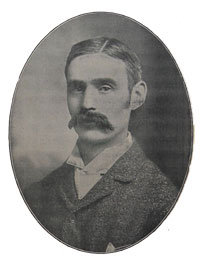Archibald McIlroy Remembered
Author: Derek Rowlinson
Date: 2012
Source: Ullans: The Magazine for Ulster-Scots, Nummer 12 Wunter 2011/12
Derek Rowlinson

At midday on the 8th of October 2011, a small crowd had gathered at the front of the Town Hall in Ballyclare, County Antrim, to witness the unveiling of a blue plaque in memory of the local author Archibald M‘Ilroy. Throughout the succession of speeches, from Chris Spurr, Chairman of the Ulster History Circle; Martin McDonald of the Heritage Lottery Fund; Ian Crozier, Chief Executive of the Ulster-Scots Agency; and William Webb, Mayor of Newtownabbey, the Mcllroy devotees stood patiently under a grey sky and the inevitable downpour of rain. Then, finally, as the Mayor drew back the ceremonial curtains to reveal this well-deserved and long overdue memorial, it was greeted by a hearty round of applause from the assembled group. On the plaque could be read the inscription:
Archibald McIlroy
Writer and Storyteller
1859-1915
born in
Fluther Loanin
Adjourning within, to the welcome dryness and heat of the Old Town Hall, all made their way upstairs to a room where an exhibition pertaining to the life and work of the author had been arranged by Etta Mann of the Ballyclare Historical Society. Ronnie Hassard, Headmaster of Ballymena Academy, and a long-time admirer of McIlroy’s writing, gave a short, but informative, biographical account of the author. Then Jeanette McKendry of the Ballyclare Historical Society delivered two readings from M‘Ilroy’s most successful book, The Auld Meetin’-Hoose Green. First, she chose to read an extract from the sad but heart-warming story ‘The Widow’s Son’, followed by a humorous piece on marital discord from the chapter ‘By the River Banks’, concerning the newly-wed Loudie MacAlshinder and his wife Jinsy. The event was rounded off with the serving of refreshments, accompanied by music from an ensemble of Ballyclare High School pupils.
On sale were copies of The Auld Meetin’-Hoose Green, originally published in 1898 and reprinted by the Ulster-Scots Language Society in 2011 under its publishing imprint of ‘Ullans Press’. This edition includes an Introduction by Dr Crawford Gribben and a Linguistic Analysis by Anne Smyth, Chairman of the Language Society. The Ulster-Scots Language Society deserves much credit for initiating, not only the republication of McIlroy’s most popular book, but also the erection of the plaque in his honour.
In 2010 the Society produced a promotional leaflet on the author, entitled ‘Forgotten Son of Ballyclare’, and in that leaflet it was stated that ‘sadly there is no blue plaque or monument to commemorate the life of Ballyclare’s most successful literary son …’. Staff and a member of the Society distributed it in the town and, fortuitously, Councillor Etta Mann happened to receive a copy and promptly took up the challenge of lobbying for some form of official recognition for the author.
When the Ulster History Circle was approached, it received the request for a blue plaque very positively. It in turn sought funding from the Heritage Lottery Fund and the Ulster-Scots Agency, both of which agreed to share the cost of producing and erecting the plaque. Newtownabbey Borough Council provided the venue and covered the costs of the event. And the rest, as they might say, is local history.
Archibald M‘Ilroy is a most unusual writer, in that he was an exponent of prose writing in Ulster-Scots, although the use of the language was confined to his dialogue. Poets there are a-plenty, but over the centuries the number of Ulster-Scots prose writers has been few and far between. Therein lies the importance of his books. Their worth as local and social history aside, they provide an invaluable record of how the folk of that part of County Antrim spoke in the nineteenth and early twentieth centuries. The sad caveat is that, in his introduction to The Humour of Druid’s Island (1902), M‘Ilroy explained that he had to adapt the speech to suit his audience:
‘The only liberty I have taken with this rich inheritance is to water it down a little, to suit public taste. In its purity, like certain other products of the country, none but the native-born could imbibe it’.
He was also prescient enough to foresee that, in a rapidly changing world, with advancement in communication systems, the language he so loved would be under threat of extinction. So, although he may not have benefited us by recording the local speech in its densest form, he has at least left us with a degree of linguistic legacy, and that inheritance is all the more important as time marches on and Ulster-Scots becomes diluted even further. He helps to provide a yardstick against which modern Ulster-Scots can be measured and, should the desire be there, a vocabulary to be reclaimed.
The importance of the blue plaque and its concomitant publicity is in the interest that it is likely to regenerate in M‘Ilroy’s works and, as a corollary, in the language that he so obviously cherished. Archibald M‘Ilroy was an intelligent and humorous writer and, as such, his works are the best of ambassadors for a revival of Ulster-Scots.

